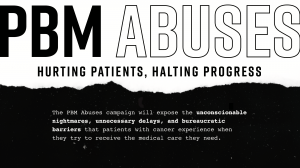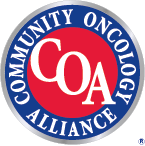Community Oncology Alliance Launches Major National Campaign to Stop PBM Abuses and Highlight Patient Horror Stories
PBM Abuses Campaign Launched in Conjunction with Community Oncology Hill Day, Featuring Meetings Between Members of Congress and COA Advocates
In recent years, PBM practices and bureaucracies have increasingly been getting in the way of Americans’ access to quality cancer care, oftentimes making decisions based on profits rather than patient need. New policies and proposals put forth by Congress and the Administration would give PBM middlemen more power, instead of less. This will allow dangerous practices, like “fail-first” step therapy and formulary restrictions that cancer care providers know won’t work and may harm patients. Ultimately, oncologists and other cancer care professionals warn that without action, PBM abuses will undermine the incredible, lifesaving progress the United States has made in cancer care and medicine.
While discussions of PBMs and other middlemen often focus only on the economic impact of rules and regulations, there is not enough discussion about the impact they currently have on patients. COA collects reports of real-life patient horror stories in dealing with PBMs and cancer care that capture the suffering experienced at the hands of PBMs due to delayed access to care, denial of coverage, arguments with physicians over proper treatment, and even failure to receive medications.
“Too many of our patients are threatened not just by cancer but also by their PBMs. The PBM Abuses campaign seeks to make sure that their stories and experiences are understood in Washington,” said Michael Diaz, M.D., a practicing oncologist, Florida Society of Clinical Oncology (FLASCO) director of patient advocacy, and COA president. “It is time for Congress to take action to stop PBM abuses. If PBM abuses are not brought under control, the problems they create could undo the progress we have seen in cancer care treatment advances in recent years.”
The PBM Abuses campaign includes an interactive patient stories website at www.PBMAbuses.org, video education, storytelling online and across the Community Oncology TV network, a strong social and digital media presence, and COA’s national grassroots networks. The goal is to convince lawmakers to take concrete steps to stop PBM abuses that are hurting patients with cancer.
The PBM Abuses campaign is being launched in conjunction with a community oncology Hill Day during which advocates from across the country are attending meetings with Senators, Representatives, and their staff to push for action to stop PBM abuses. The group in Washington today includes physicians, pharmacists, nurses, administrators, patients, caregivers, family members, and survivors from 15 states.
A legislative focus for the advocates will be pushing for support of efforts to rein in PBM abuses, such as the Improving Patient Access to Cancer Treatment Act, or “IMPACT Act.” Under the proposed legislation, PBMs, plan sponsors, insurers, and pharmacies, including specialty and mail order pharmacies, would have to ensure that a patient with cancer is able to receive their prescription medication within 72 hours of submission. This includes any time needed for prior authorization or reviews by the pharmacy benefit plan provider. If this is not possible, then the patient would be able to obtain the prescription medication from any other licensed pharmacy, and have the service covered under the patient’s plan and benefits.
“Oncologists have long seen how harmful PBMs can be to patient welfare,” said Ted Okon, COA executive director. “No longer will they tolerate a third party PBM inserting itself between the patient and the physician, limiting access to care, delaying the start of care, failing to properly manage patients, and increasing the cost of care every step of the way. This must stop now!”
Additional information about the PBM Abuses campaign is available at www.PBMAbuses.org.
# # #
About the Community Oncology Alliance (COA):
The majority of Americans battling cancer receive treatment in the community oncology setting. Keeping patients close to their homes, families, and support networks lessens the impact of this devastating disease. Community oncology practices do this while delivering high-quality, cutting-edge cancer care at a fraction of the cost of the hospital setting. The Community Oncology Alliance (COA) advocates for community oncology and smart public policy that ensures the community cancer care system remains healthy and able to provide all Americans with access to local, quality, affordable cancer care. Learn more at www.CommunityOncology.org.
Nicolas Ferreyros
Community Oncology Alliance
+1 202-729-8147
email us here
After weeks of delays, a young husband’s life-saving drug finally arrived, only after it was too late. This is his PBM horror story. Stop PBM Abuses!
Legal Disclaimer:
EIN Presswire provides this news content "as is" without warranty of any kind. We do not accept any responsibility or liability for the accuracy, content, images, videos, licenses, completeness, legality, or reliability of the information contained in this article. If you have any complaints or copyright issues related to this article, kindly contact the author above.


